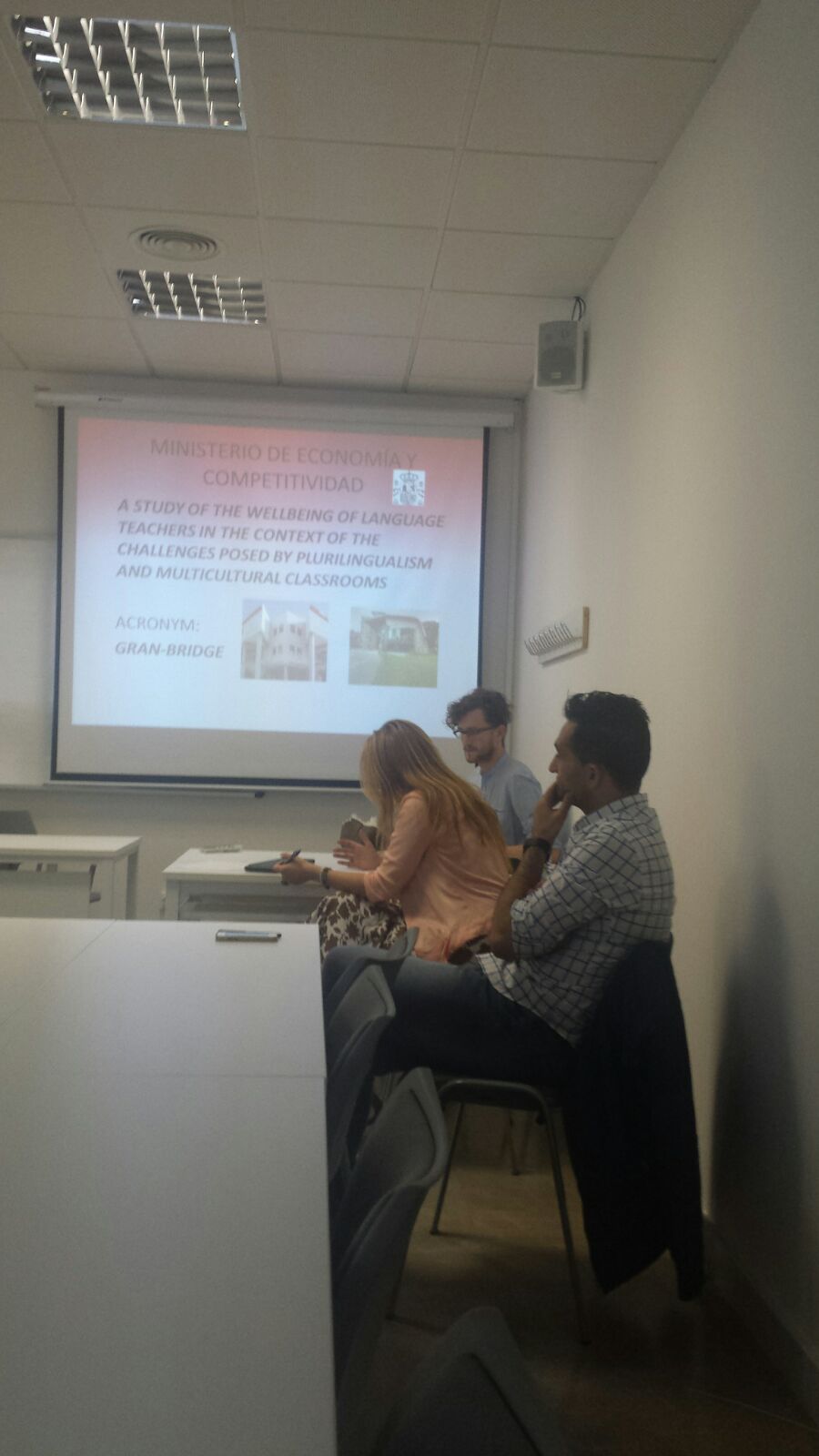Project description
The project aims to diagnose teacher well-being within CLIL (Content and Language Integrated Learning) programs in Primary and Secondary Education, as well as CLIL/EMI (English as a Medium of Instruction) programs in universities within the context of Andalusia, using an ecological paradigm. Additionally, the project seeks to develop an effective model to promote this well-being. This field is practically unexplored within our scientific context, yet it has a significant demonstrated impact on the quality of education and the psychophysical health of teachers. We start from the premise that teaching is one of the professions with the highest emotional demands and stress, further exacerbated by the competency and communicative demands of CLIL/EMI programs.
To achieve these objectives, a mixed-methods approach, both quantitative and qualitative, is employed through three well-defined phases:
- Descriptive-Exploratory Phase: This phase involves a critical analysis of existing literature and the initial and ongoing training programs related to teacher well-being.
- Descriptive-Analytical and Evaluative Phase: This phase focuses on designing quantitative and qualitative research instruments tailored to the CLIL/EMI context. These instruments will help identify needs, areas for improvement, beliefs, experiences, and strategies from the perspective of the involved teachers, administrative representatives, and leadership teams/coordinators. The insights gained will lead to the creation of a validated and consensual tool for diagnosing and promoting teacher well-being within this study population.
- Conclusive-Disseminative and Knowledge Transfer Phase: This phase emphasizes not only the need for scientific dissemination but also the necessity of transferring knowledge to the teachers themselves through the agents responsible for their initial and ongoing training, with the aim of improving their professional and personal satisfaction.
The project, funded by the Spanish Ministry (Ministerio de Ciencia e Innovación), is carried out by a team of researchers from the University of Granada in collaboration with a partners from other universities.
INFO
Title: Estudio ecológico del bienestar docente del profesorado de programas CLIL (Primaria y Secundaria) y CLIL/EMI (Universidades) en el contexto de Andalucía – WELL-CLIL
Code: PID2021-128341OB-I00
Institution: UNIVERSIDAD DE GRANADA
Faculty: FACULTAD DE CIENCIAS DE LA EDUCACION
Main researcher 1: Juan Ramón Guijarro Ojeda
Main researcher 2: Raúl Ruiz Cecilia
Period: 1/09/2022 – 31/08/2025
Funded by: MINISTERIO DE CIENCIA E INNOVACIÓN
Project reference number:
PID2021-128341OB-I00


Acronym
WELL-CLIL

Key words
Teacher wellbeing, professional development of language teachers, narrative approach, plurilingualism, EMI.

Estudio ecológico del bienestar docente del profesorado de programas CLIL (Primaria y Secundaria) y CLIL/EMI (Universidades) en el contexto de Andalucía – WELL-CLIL
Ecological Study of Teacher Well-being in CLIL Programs (Primary and Secondary Education) and CLIL/EMI (Universities) in the Context of Andalusia – WELL-CLIL
El proyecto pretende diagnosticar desde un paradigma ecológico el bienestar docente del profesorado de programas CLIL (Aprendizaje Integrado de Contenidos y Lenguas Extranjeras) de Educación Primaria y Secundaria y CLIL/EMI (Inglés como Medio de Instrucción) de Universidades en el contexto de Andalucía, así como desarrollar un modelo eficaz que permita fomentar ese bienestar. Se trata de un ámbito prácticamente inexplorado en nuestro contexto científico y, sin embargo, con una importante influencia demostrada en la calidad de la educación y en la salud psicofísica de los docentes. Partimos de la premisa de la educación como una de las profesiones con mayor demanda emocional/estrés que se ve incrementada aún más por las exigencias competenciales y comunicativas de los programas CLIL/EMI. Para conseguir estos objetivos se lleva a cabo una metodología de carácter mixto, cuantitativa y cualitativa, con tres fases bien definidas: 1) descriptiva-exploratoria: análisis crítico de la literatura existente y de los programas de formación inicial y continua sobre bienestar docente; 2) descriptiva-analítica y evaluativa: diseño de instrumentos cuantitativos y cualitativos de investigación sobre bienestar docente adaptados al ámbito CLIL/EMI que nos permitan detectar necesidades, puntos de mejora, creencias, vivencias y estrategias por parte del profesorado implicado, representantes administrativos y equipos directivos/coordinadores; estos conocimientos conducirán a la creación de una herramienta consensuada y validada para el diagnóstico y fomento del bienestar docente de esta población de estudio; y 3) conclusivo-divulgativa y de transferencia del conocimiento: se hace hincapié en la necesidad no solo de la divulgación científica, sino en la necesidad de transferir el conocimiento al propio profesorado a través de los agentes encargados de su formación inicial y continua en aras de mejorar sus condiciones de satisfacción profesional y vital.
Referencia: EDU2013-44890-P
Ministerio de Ciencia e Innovación
Investigador principal 1: JUAN RAMÓN GUIJARRO OJEDA
Investigador principal 2: RAÚL RUIZ CECILIA
Entidad solicitante: UNIVERSIDAD DE GRANADA
Centro: FACULTAD DE CIENCIAS DE LA EDUCACION
Título: Estudio ecológico del bienestar docente del profesorado de programas CLIL (Primaria y Secundaria) y CLIL/EMI (Universidades) en el contexto de Andalucía – WELL-CLIL
Duración en años: 3
INVESTIGADORES Y EQUIPO DE TRABAJO:
EQUIPO DE INVESTIGACIÓN:
- Cristina Pérez Valverde (Universidad de Granada)
- Dimitrinka Níkleva (Universidad de Granada)
- Remedios Sánchez García (Universidad de Granada)
- Antonia Navarro Rincón (Universidad de Granada)
- Javier Villoria Prieto (Universidad de Granada)
- Ana María Ramos García (Universidad de Granada)
- Leopoldo Medina Sánchez (Universidad de Granada)
- Manuel Jesús Cardoso Pulido (Universidad de Granada)
- Antonio Garcés Rodríguez (Universidad de Granada)
- Matilde Pérez Descalzo (Universidad Alfonso X El Sabio)
EQUIPO DE TRABAJO:
- Slava López Rodríguez (Universidad de Granada)
- Fabio Loporcaro (Universidad de Palermo)
- Carmen Carvajo Lucena (Doctoranda. Universidad de Granada)




